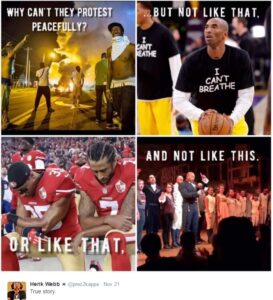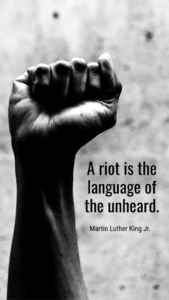I graduated high school in 1968 and then met the man I would marry during my first year of college in 1969. I often think back about who I was during those years of national tumult and transition. I was so wrapped up in my own personal transitions, I confess I didn’t pay close attention to the turmoil going on in our country. I confess I looked at the riots and assassinations with shock and disapproval, maybe even with a touch of disdain and moral superiority. Then I escaped back into my Southern-White-Christian-Woman bubble and lived my small life—never really seeing the underlying realities of systemic violence that produced the protests and pushback in the first place.
Now, fifty years later, I’m grateful to say I’ve emerged from that bubble and I see with different eyes. Eyes that are opened to a more accurate reality and a heart softened to the pain of the world around me. This honest seeing is painful, but I still choose it over the old blindness that kept me so comfortable. The blinders that made me complicit.

Now, fifty years later, I’m sad to see exact same patterns of disdain and moral superiority demonstrated by too many of my White Christian neighbors in reaction to our current cultural chaos. And I grieve to realize that many of the underlying realities of systemic violence have scarcely changed in all these years.
Violence begets violence and our vicious cycles of violence continue. Which prompts this question in me: Which kinds of violence should we allow and what types of violence should we condemn?
As it stands now, within too much of White America, it looks to me like we are too comfortable with the hidden-to-us violence of housing discrimination, inequities within our health care system, the re-segregation of our public schools, the vast inequality of economic opportunities, and the over policing of the Black and Brown bodies of our neighbors. Not to mention the violent, abusive, and bullying rhetoric that comes out of too many people’s mouths—from the highest office in the land to the coarse jokes in casual conversations to the intentional fear mongering on TV and social media.
Why do we allow this pervasive cultural violence to continue while we criticize the push back violence that comes in response? Why do we pretend one kind of violence is all right but the other kind of violence is not?
It is a sad truth that this nation chose violence as part of its original DNA. The Founders brilliantly proclaimed that the Creator created “all men equal,” even as they knew full well they did not really mean for that “all” to mean “all.” They intentionally did not consider women as equal, or the native people in whose land they lived, and certainly not the Black people who were enslaved within their own households.
This notion of blatant inequality enshrined in our founding documents has prompted numerous cycles of violence throughout our history. And whose fault is that? I wonder.
But then I realize: that is the wrong question. Assigning blame does nothing to break these vicious cycles. Accepting responsibility is the only thing that will save us.

What the founders did, or what earlier generations did or even what I did as a guileless, clueless young woman is beside the point; that is all history. The point is: this is OUR time and now WE are responsible for our future.
It is up to us to dismantle the structures of institutional violence—even if they don’t harm us personally; to call out the rhetoric of violence—even if it comes out of the mouths of people we love and respect; to condemn reactionary violence wherever we see it—not just in the actions of violent protesters but also in the police who over respond with (sometimes) legally sanctioned violence and in the right wing domestic terrorists who brazenly incite violence.
Dr. King taught us: “a riot is the language of the unheard.”
If we truly want to resist our nation’s slide into anarchy, then we must listen to these cries of pain, anger and oppression and we must respond with courage, justice and compassion.
Otherwise, we will miss our chance to break the deadly cycles of violence.
It is our turn.
See also Charlotte’s blog: All This Audacious Looting
Dr. Martin Luther King Jr. talked with Mike Wallace of 60 Minutes in September 1966. Listening will take just 4 minutes of your time and his words are so very important.
I appreciate your story so much. It gives me hope. My story is very different. As a first or second grader in the mid 50s I saw the ravages of desegregation on the TV news. Shocked, I asked my mom, “why are those adults being so mean to those children?” My mother’s answer was, “some people are never adults no matter how old they are.” What a conundrum for a child! But it struck a deep cord with me. A few years later, Dr. King became my hero. I was 15 when the video above was made. He spoke my heart. I think I cried as much for him as I did for President Kennedy during that terrible decade of political assassination. His truth has informed my entire life. I cannot tell you how stories like yours soothe this aching heart. For those 50 years I have felt so alone in my convictions, especially in the face of my whiteness and the privilege it brings. I am no latte liberal, I am a child of a world vision where there is dignity enough to go around for all of humanity.
Sometimes I wish I had had eyes to see and ears to hear all those years ago, Jeanene. But then I realize the journey I’ve made and the process I’ve gone through is important and significant in itself. See here other comments from people who have made similar journeys. Each story is unique and yet our stories so often share common themes. Thanks for reading and thanks for the conversation! Peace.
Thank you for your columns. I saw one in the Paris News and signed up for your blog.
My white parents grew up near Paris TX, deceased but would be in their 90s now, and it seemed they were unable to articulate what life was like for black people when they were young, segregated and oppressed. Looking at one of mother’s high school group pictures, I asked my mom where the black kids went to school. She looked shocked and stammered, “I don’t know, I guess they had their own school”. Dad recalled a black woman who was illiterate and asked him when he was a boy if she’d been cheated at a shop, and Dad said he saw a dragging and some Klan activities. Just an occasional anecdote.
What if someone in our family had been lynched? Dragged through the streets? Killed or maimed by a cop? Wrongly accused and imprisoned? Denied a good schooling? Not allowed to have a certain kind of job, live in a particular neighborhood, or attend certain churches? Worked to the bone but unable to escape poverty? Been easily cheated in business? Denied the vote? Scorned and humiliated and ignored? But simply because my parents were white, these things didn’t happen to them. There was no societal foot on their necks. Why didn’t my parents and relatives talk openly and often about these disparities?
I wish my parents had been able to tell me more, how they felt, what they saw In everyday life when blacks and whites interacted in places like Paris TX, in the 1930’s-1960’s. I asked them often. They seemed to lack the frameworks, awareness and vocabulary we now have to understand how racism is deeply embedded in US history and society, for example, as a caste system, as Isabelle Wilkerson has written in her latest book.
We need these generational stories. We need to listen and learn to be empathetic, and learn. We can go deeper towards healing. We can overcome denial.
I applaud your well written columns. Keep it up! If you think it would be helpful, please write about what older white Texans were thinking during segregation.
I love your comments here! Thanks so much for connecting and letting me know a bit about your background. We all have our own unique stories, don’t we? And yet the more we share our stories, the more connections we find. I love that about this blogging work I’m able to do. Thanks for being a partner! Stay safe and well. Peace, Charlotte
I am a 68 year old female and grew up in Louisiana. I agree, this is my story too. Thank you Charlotte for giving voice to my feelings.
I look forward to your email in my inbox, heralding a new blog post, every week. You always write powerfully and prophetically. Thank you!
I am a 69 year old female and grew up in East Texas. Your story is my story and I thank you for giving a voice to my feelings. The video of Martin Luther King on 60 Minutes was new to me. “It has been too long” and here we are 50+ years later still fighting for his dream. We have to do better!
Yes, Nancy, my sister. It’s our turn and we must do better.